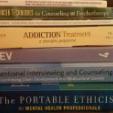-
Posts
449 -
Joined
-
Last visited
Everything posted by Cheshire_Cat
-

What is it like to have a Graduate Assistantship?
Cheshire_Cat replied to Gdcovme's topic in The Bank
Well, I had one in my masters, and I will in my Ph.D. My GAship was the highlight of my masters, to be honest. I worked with first year students in a freshman year program we had. I got to advise students and sit in on their class, and create "service learning opportunities" for them, and grade papers. It was a lot of fun. (Grading-Not so much, but that is what auditors basically do for a living) The professors were pretty laid back and seemed impressed at my work. All I did was show up when I was supposed to and do what I said I was going to do, but apparently that is not always the case for some GAs. The only thing is, if you have clinicals, it can interfere with them. My office mate had a problem with that. And my schedule for the second semester left me 15 mins between my own class and the one I helped out with, even though we were on separate campuses. -
So this will last for a while... I'll be attending a program within walking distance of where I work now. So I'll have to have self control. Hopefully when I see my (then) former coworkers, I wont grab them and beg them to take me with them, haha!
-
Just got my fall schedule. THIS IS REALLY HAPPENING!
-
Well, it is that time of year again for our office- Goal setting for FY 2016. So of course, I jokingly filled out the form with my goals for the Ph.D program instead of my job. I'll fill it out in earnest for my job in a little while. Anyways, I thought it was a good exercise, clarifying some of the things I need to do for my Ph.D program, and so I thought I'd bring the question to you. What are your goals for 2016 and how will they be achieved? My work also has a format, so I'll use that. Goal 1 State Goal: Refresh my understanding of linear algebra, calculus, and intermediate statistics. How does this goal link to career growth and/or personal performance? A better understanding of these three topics will help me in my research and perform better in my Ph.D classes. How will it be measured? Complete MIT open courseware classes on these three topics. Goal 2 State Goal: Become more familiar with current research in the area of accounting, specifically auditing. How does this goal link to career growth and/or personal performance? This will help me to understand what the hot topics for auditing are right now, which can then give me ideas for my own research. How will it be measured? I want to develop a habit of reading at least one or two journal articles a week, outside of my coursework. I also need to familiarize myself with the top journals in my area. Measuring this should be by counting how many outside articles I read each month, with the goal of 6. Or by reading and journaling for 30 minutes a day, 6 days a week on research articles I read. Goals 3 &4 are just to perform satisfactorily in my doctorate classes and budget my money wisely. I think how it helps and how it will be measured is pretty self explanatory. (3.5 GPA and little or positive budget variance) So, what do y'all think? Do you have any goals you want to share?
-
This is my emotional cycle. First I'm super excited and can't wait for it to get here, then I'm like "why are you so excited? It's a huge pay cut and a lot of work, and you haven't been in school for a while, what if you aren't good at it?" so then I become nervous/terrified. So then I try comforting myself by listing all the good things, such as afternoon naps and pushing towards my goals, so then I'm excited again and can't wait... back and forth this goes.
-
Yeah. With facebook the only professors I have as friends are the ones I consider actual friends (Generally the ones I knew before college, who talked to me as an adult at the professors social events I got dragged to as a teenager.) But Twitter is different. It is used for interactions with "fans" mostly. So following a PI wouldn't be weird, imo.
-
Ahh! I know how you feel. Somewhere between 24 and 25 it went from "Oh, you have plenty of time!" to "Why aren't you married yet?"
-
Dude, marketers think of a 30 second pitch to sell toilet paper, and everyone knows exactly what that does. Networking is done at conferences, and yes, in elevators. Sometimes that 30 seconds may be all you get to say, you don't get to have full conversation, but it may lead to a connection that is useful in your career. Some of us aren't blessed with the ability to describe our research interests succinctly and in a clear manner without effort. It is important to not sound like a stammering mess, or require the listener to use a dictionary in order to understand us. Also, thinking of a 30 second pitch can help clarify your research ideas and goals to yourself. It is a good exercise.
-
Mostly I spend my time explaining that no, getting a Ph.D in accounting does not mean I get to charge more to clients, it means I'm going into a completely different area and I will be researching accounting. And, no- I don't do taxes. That is about as far as the conversation goes. No one cares what an accounting researcher researches except other accounting people. And everyone thinks they know what an accountant does, so I don't have to explain much. In fact, I could probably say that I'm a certified public accountant for the next 5 years and bypass the whole conversation. Does getting your Ph.D count towards CPE? But, if I were to need a pitch. As of now, for what I want to study- I study how auditor bias affects risk assessment and the decision making process, with particular emphasis on political and cultural bias. This is an important area of study because it affects the timing and reliability of an audit. For instance, does an auditor of an international company need to understand the culture in order to audit effectively? And, if a company has a strong political stance, such as Hobby Lobby with birth control, if the auditor disagrees with them, are they more likely to asses higher risk? If they agree, are they likely to asses lower risk? A lot of big words, but if someone asks, they probably understand big words. Everyone else is still trying to grasp the fact that I'm researching accounting, not doing it.
-
Real job senioritis? I should just leave now and take the rest of the week. Maybe next week I'll be productive.
- Show previous comments 1 more
-

-
-

I know! That is why I'm still working. That and having nothing to do would drive me up the wall.
-
Leaving this job is not unlike breaking up with a boyfriend. One second I'm like "No! I can't believe I ever wanted to leave! I love it here!" And the next second I'm like "Stupid job. Good riddance! The day I accepted my grad school offer was the best day of my life."
-
Seeing my coworkers who were kind of in my "cohort" get promotions before me really sucks. I don't care if I'm going into the Ph.D program. It still stings. I was put on the crappy project because I was the one with the most potential. They were left on their projects because I was better than them, and now they are getting promoted and I'm not because the project managers in a different office were stupid. I feel like I've been screwed over and it isn't fair. I'm just going to spend the rest of my time here reading Ph.D Comics and drinking coffee (and studying matrix algebra) I don't freakin' care... except I do. I'm happy for the ones getting promoted, but I should be promoted too. Except I know that "my work" doesn't reflect that, but I feel like that was because of the other office gave NO feedback until it was too late. If it was something I had done, or not done, I would be happy to take full responsibility and understand why. But I worked more hours on a harder project than any of them and then I got screwed over. It isn't fair. I'm done. I'm done caring. I'm done trying. It doesn't matter anyways. I think I'll take sick for the rest of the week. It doesn't matter anymore. Why the hell should I care? I didn't want to climb the ranks in the first place. But I did want my hard work to be acknowledged, and instead I'm being treated like I'm slow-witted and lazy. I'll show them slow-witted and lazy. (No I won't. But I really wants to.) 3 months and 14 days until grad school.
-

Profile Evaluation for PhD Finance and a couple questions
Cheshire_Cat replied to financephdhopeful's topic in Applications
For accounting, the GMAT was required at every school I looked at, but they were sometimes the only program in the business school that required it. I'm not sure about finance. I know business schools always accept the GMAT, but it is hit or miss on if they accept the GRE as well. Most do, but there were a few that didn't. So to be safe, I'd take the GMAT. From what I've seen, I think the GMAT verbal is so much easier than the GRE verbal, but I've heard the math can be a little bit more difficult. -

Profile Evaluation for PhD Finance and a couple questions
Cheshire_Cat replied to financephdhopeful's topic in Applications
Econ and math will help. They seem to love the maths. The professors you will want to write your LORs are the ones who you have built a relationship with and are research active. You probably need to take the GRE, or GMAT again. Try to get in at least the 90th percentile to be competitive. Especially if you are saying you are decent at math. Accounting is the business program that I feel wants to most outside experience, and it seems to be about 50/50 on students with and without experience in industry, so I don't think that will hurt too much, especially if you have research experience. Ask your LORs for recommendations of where to apply. A lot of times they have connections and a recommendation from someone who they know will go a long way. I got into a 30-40 program, and I'm the only one in my cohort that I know of with industry experience, so it is certainly not a pipe dream. My GPA was a bit higher than yours, 3.98, but my GMAT was only in the 83rd percentile, and I'm sure you can do way better than that if you study. -
I'm in accounting, and apparently only smart people do accounting, so I already get the "I could never do math" thing a lot. I usually just have some self deprecating thing to say about it. Probably when I'm in a Ph.D program, I'll mention that what I want to do with it is research and teach accounting, "because ya know, those who can't do teach..." or something like that. I don't think most people know what to make of Ph.D students other than "Oh wow, that person is smart!" but I don't feel like they think you are bragging for being in a Ph.D program. More likely they are wondering why you couldn't get a "real job" or something like that. The key to being interesting is being interested. Repeat this ten times before you go to bed, every night for a year. I used to be terrible at small talk, or any talk, actually, but now I've gotten complements on how good a conversationalist I am. You really don't have to know much about sports or celebrities, as long as you ask questions about them and listen well. During football season, I generally keep an eye on the W/L records of the teams everyone loves here, and read a few news articles as they come across my newsfeed. I repeat the opinions in the news articles or, better yet, disagree with them and then listen to people say whatever they want to say. Most of my conversations don't revolve around work or hobbies though. Generally they revolve around experiences. One of my coworkers and I talked for 30 mins yesterday about our parent's spending habits, ect. And when all else fails, you can talk about the weather. I'm not kidding. Not "Oh, it's hot outside" "Yes it is" but say something about what you think about the weather "It's hot outside and I have to mow the grass on Tuesday which is going to be such a chore..." "Yeah, I know! But I'd rather it be hot than it be cold any day. At least you can go inside when it's hot. When it's cold it seems like you can never warm up..." and then, you go with the flow. That conversation may lead into what types of clothes are best for the weather, where the person has lived before, or how they have family in a different climate... and then you are set. It takes practice. I still hate talking about myself most of the time, and I felt so stupid when I first started trying small talk. I have journal entries where I wished I was legit mute so I would have an excuse to be quiet all the time. But it is a useful skill, and shying away from it doesn't help anything.
-
I have another guy friend that I haven't seen in three years, and I still miss him too, more than I'll miss my favorite guy. We were never romantically interested in eachother, however I wouldn't have survived college without him. He was the first person I talked to voluntarily. Somehow, he saw how shy I was and was able to gently coax me out of my shell in a way no one had been able to before. He was my comfort zone, my shelter in the storm. If I was overwhelmed, I could go be near him and everything would be ok. And he gave great hugs. I don't want to miss anyone else like I miss him, but inevitably if you get close to someone, you will. I'm tired of my friends up and leaving. I hate the transient nature of being a young adult. In other news, why does my body think it has to wake up at 6:30 on a Saturday morning? Shops aren't even open until 10. Kroger is. Maybe I'll go grocery shopping while no one else is crazy enough to be there.
-
My favorite guy leaves on Tuesday for his summer internship. Sad. I just want to give him a hug and never let go. But since he doesn't like physical touch, that wouldn't go over well. So I'll just be mean to him because I'm mad he has to leave. It isn't even his fault, but I still don't like it. He'll be back by the time I'm in school, I know. But I don't want him gone in the first place!
-

NYT Article Re: Sense of Entitlement to Good Grades
Cheshire_Cat replied to synthla's topic in The Lobby
Thats more of an indictment of our public school system than anything. I had never written a graded paper until college, yet my English classes were among the easiest for me. But obviously, things aren't as simple as a three paragraph post makes them out to be. I'm speaking more about averages. -

NYT Article Re: Sense of Entitlement to Good Grades
Cheshire_Cat replied to synthla's topic in The Lobby
There are some who see the education system, especially at its lower levels, and decide that it isn't an effective way to educate their children, and they can do it better. Obviously, with a Ph.D and experience with teaching, a lot of the time they can. -

NYT Article Re: Sense of Entitlement to Good Grades
Cheshire_Cat replied to synthla's topic in The Lobby
I have known several professors (some even single income) who homeschooled their children. It can be done. Academia lends itself to homeschooling. -
I have a count down app on my tablet...111 days for me. But I will turn in my resignation to focus completely on bringing my math skills up to par in 9-11 weeks. I am really excited, but also dreading it. So much work! And living off a grad stipend isn't going to be fun. I'm lucky that my school is in the town I live in now, so I don't have to leave my friends behind. And now that work has calmed down and I'm off the Project of Doom, I'm kind of sad about leaving my job. Between now and then I still have some on-site audits and other things I have to do that should be fun. And I love the people. I will go back to my old project for five or six weeks, and my manager and senior manager there are like my work moms. It is going to suck to tell them I'm leaving. Like scarvesandcardigans, I don't like the 9-5 though, and can't imagine doing it forever. It does seem soul sucking. Like I'm stuck in a cage. I was homeschooled by what would now be called "free range" parents too, so I'm used to a ridiculous amount of freedom. And I'm happiest when I'm learning something new. Even if it is math, which is my worst subject. I can't do the 9-5 life forever. I just can't. Sitting in a cube is boring. I am really excited to be more in charge of my schedule, and being more independent, even if it does mean working a lot more. I do best when it is all up to me.
-

NYT Article Re: Sense of Entitlement to Good Grades
Cheshire_Cat replied to synthla's topic in The Lobby
I think there should be one criteria for students making the grades they make. Do they understand the material? I had a system in undergrad. I would go to all the lectures, but not take notes. Read all the assigned readings, and do all the homework. In my whole undergraduate career, there were less than 10 class where that system did not give me an automatic A. For those classes, I had to put in a little more effort, outline some chapters, memorize some formulas, find some extra practice problems... (I am smart. Blame genetics. But most people should be able to make Bs) I think with most topics, putting in the effort that I did should result in at least a B. However, some topics are just hard to understand. And if you don't understand the material, you shouldn't pass. So I guess my stance is that for most classes, putting in the effort should give you the grade, because for most topics, that much effort you should give you an understanding of the material. But there are some that require extra effort to understand the material, and when those classes come up, you have to make the effort. You can't just say "well, I tried like I always do" it certainly doesn't work that way in the real world. -
I'm comfortable with a trackpad, but a mouse isn't that big, or expensive if you lose it, so I'd probably just bring it with me. Or leave one in your office if you get one. On the topic of beds, I've always had a twin, which is fine for one person, but I slept in a queen over Christmas and now I want one, haha. Don't know if I want to shell out the cash though. Even if it is a small college town, there should be a mattress store or two. Ours had at least three or four in a metro area of 100,000.
-
Interesting. One thing that they said the GMAT is supposed to show is how well you triage, because of the time limit and such. You can't answer every question, so you answer the ones you can. It is also a useful skill in the working world. When I first started working, my position was such that I could clear my desk and then take a vacation when I had nothing else to do. However, for the past year, there has always been something that has needed doing, and I'm never done with everything. At first this really frustrated me, and I have a hard time taking breaks when I have something to do. (I also worked way more than 9-5) But I suppose it is good that I've learned how to manage that anxiety now (barely, haha) because when I get to my program, it will be similar. I want to have one day a week to rest. I've always kept one day, in undergrad and working, but the actual day varied. I think the main thing is to commit to a rest time, and make that a hard commitment. It is easier to be inefficient when you think you can do things on the weekend, but if you commit to not working on a certain day, then you have to get everything done before then. I'm really glad to have this forum so I can learn these tips and strategies before I start my program.
-
I have a great deck with a view of nature and an electrical outlet. I'm going to have to invest in some patio furniture so I can work outside when my neighbors aren't outside smoking. (I can't stand cigarette smoke. And my neighbors are always outside with a cig in the evenings. It's annoying!)




